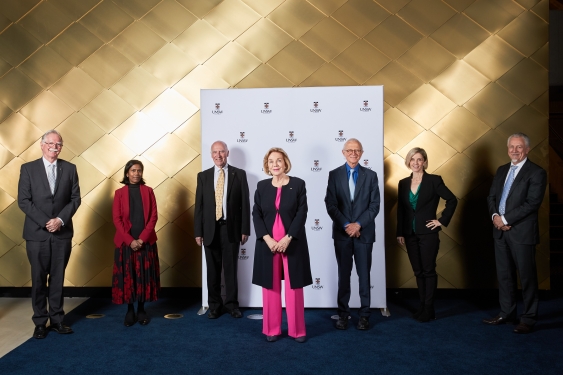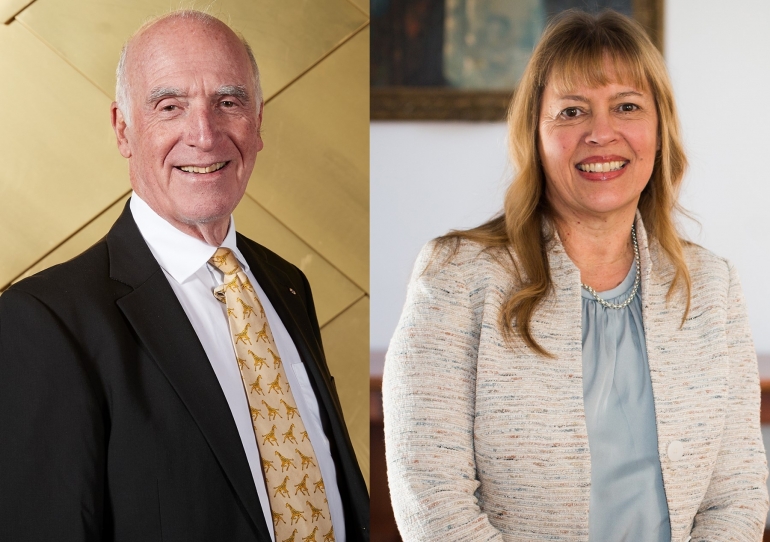Dual winners of the 2020 Australian Mental Health Prize were announced this evening, recognising two exceptional advocates who represent the important work being done to improve mental health across the country. The Governor-General, David Hurley, presented the winners with their awards during an online ceremony held at UNSW Sydney.
The 2020 winners of the award are Scientia Professor Gordon Parker, founder of the Black Dog Institute and Scientia Professor of Psychiatry, UNSW Sydney, and University of Western Australia Professor Helen Milroy, whose work and research has had a lasting impact on children’s mental health, combining Aboriginal and western knowledge in mental health education.
Prof. Parker and Prof. Milroy were chosen from an exceptionally strong field of seven finalists for the prize, now in its fifth year. The prize is supported by UNSW, through its School of Psychiatry.
Ita Buttrose, Chair of the Australian Mental Health Prize Advisory Group, said: “The Australian Mental Health Prize is a well-established platform to recognise those making a significant contribution to mental health nationally. In this especially challenging year, it is more important than ever to highlight the diverse and deeply compassionate work being undertaken.”
Scientia Professor Henry Brodaty, UNSW School of Psychiatry, said: “The Australian Mental Health Prize is a wonderful way to shine a light on those who dedicate so much of themselves to improving our approach in the mental health sector. This year’s dual winners, Gordon Parker and Helen Milroy, are perfect examples of Australia’s impressive talent working in this area. We should be proud of their achievements.”
Prof. Gordon Parker
Gordon Parker is one of Australia’s foremost psychiatrists. He founded the Black Dog Institute and is Scientia Professor of Psychiatry at UNSW. His research priority has been to define differing mood disorders with high precision and to determine the effectiveness of differing therapies for separate conditions, a model challenging the current ‘one size fits all’ approach.
“I am honoured to have been selected as a dual winner of the Australian Mental Health Prize. The prize has an important role in highlighting work being undertaken in the mental health sector,” Prof. Parker said.
“In observing my career over the decades, my work has always had a focus on ‘What is the correct diagnosis?’ When I entered psychiatry, I was struck by how many practitioners did not judge making a diagnosis important. Yet it is important for patients to know what is wrong, if it is serious and how long it will last.
“If the right diagnosis is made then choice of treatment becomes more logical. I developed the Mood Assessment Program (MAP) where patients enter data and the computer generates diagnoses and best treatment options. There are now over 5000 MAP providers in Australia with an 80 per cent accuracy rate in differentiating the two key depressive types and in identifying a bipolar mood disorder. Machine learning techniques adopted this year have improved accuracy rates even further in pilot studies.
“Diagnosis is extremely important in psychiatry and new artificial intelligence approaches have the potential to deliver highly accurate diagnoses to inform practitioners and their clients,” he said.

Gordon Parker, third from left, with members of the Australian Mental Health Prize Advisory Group, from left, Philip Mitchell, Valsamma Eapen, Ita Buttrose, Henry Brodaty, Sophie Scott and Jack Heath.
Prof. Helen Milroy
Helen Milroy is the Stan Perron Chair of Child and Adolescent Psychiatry at the Perth Children’s Hospital and University of Western Australia, and Honorary Research Fellow at Telethon Kids Institute. She is passionate about children’s mental health and combining Aboriginal and western knowledge systems in mental health education.
“I am very honoured and humbled to be a co-winner of this year’s Australian Mental Health Prize alongside my esteemed colleague Prof. Parker. I would like to thank the Prize Advisory Group and UNSW for making this award possible. I hope we can continue to shine a light on mental health and what else needs to happen to bring about the wellbeing of our nation, and especially that of our First Peoples,” Prof. Milroy said.
“I am particularly keen to highlight the needs of our children and the many difficulties and challenges they face, particularly during these most unprecedented times. As I think back about how my life and work has changed, I am mindful of the ‘new normal’ we are now entering into and just what this means for the wellbeing of our children.
“I have learnt so much and continue to learn from the many children, families, communities and colleagues I have worked with and shared the heartbreaks and joys with along the way. Children are no more immune to mental health challenges than the rest of society, yet they are easily overlooked or thought to be resilient.
“I believe Australia’s greatest hope for the future rests in the potential of our children. I look forward to a greater focus and investment in our children, their family and community. I hope we can feel proud when we look back, knowing we did everything to give children the opportunity to thrive, to support them when they faltered and to make sure they receive the most comprehensive and well-resourced mental health services available. That would be something to celebrate.”
The Australian Mental Health Prize was established in 2016 by UNSW Medicine's School of Psychiatry, Australia’s pre-eminent psychiatric research department. It recognises outstanding Australians who have made major contributions to either the promotion of mental health, or the prevention and treatment of mental illness.
